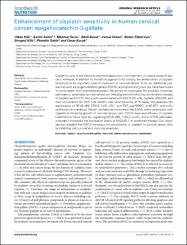| dc.contributor.author | Kılıç, Ülkan | |
| dc.contributor.author | Şahin, Kazım | |
| dc.contributor.author | Tuzcu, Mehmet | |
| dc.contributor.author | Başak, Nazlı | |
| dc.contributor.author | Orhan, Cemal | |
| dc.contributor.author | Elibol Can, Birsen | |
| dc.contributor.author | Kılıç, Ertuğrul | |
| dc.contributor.author | Şahin, Fikrettin | |
| dc.contributor.author | Küçük, Ömer | |
| dc.date.accessioned | 2020-07-06T13:12:43Z | |
| dc.date.available | 2020-07-06T13:12:43Z | |
| dc.date.issued | 2015 | en_US |
| dc.identifier.citation | Kılıç, Ü., Şahin, K., Tuzcu, M., Başak, N., Orhan, C., Elibol Can, B. ... Küçük, Ö. (2015). Enhancement of cisplatin sensitivity in human cervical cancer: Epigallocatechin-3-gallate. Frontiers in Nutrition, 1. https://dx.doi.org/10.3389/fnut.2014.00028 | en_US |
| dc.identifier.issn | 2296-861X | |
| dc.identifier.uri | https://dx.doi.org/10.3389/fnut.2014.00028 | |
| dc.identifier.uri | https://hdl.handle.net/20.500.12511/5402 | |
| dc.description.abstract | Cisplatin is one of the effective chemotherapeutics in the treatment of several types of cancers. However, in addition to the efforts against to its toxicity, the amelioration of cisplatin sensitivity is an important point in treatment of cervical cancer. To do so, additional substances such as epigallocatechin gallate (EGCG), a polyphenol in green tea, have been used in combination with chemotherapeutics. We aimed to investigate the possible molecular pathways to potentiate cervical cancer cell (HeLa) growth inhibition by combination therapy of cisplatin and EGCG. HeLa cells were treated with EGCG (25µM), cisplatin (250 nM), and their combination for 24 h. Cell viability was determined by MTS Assay. We analyzed the expressions of NF-κB p65, COX-2, Nrf2, HO-1, p-mTOR, p-p70S6K1, p-4E-BP1, and p-Akt byWestern blot analysis. Herein, we have demonstrated that EGCG works synergistic with cisplatin in inhibiting growth of cervical cancer cells. EGCG improved efficacy of cisplatin treatment in HeLa cells by regulating NFκB p65, COX-2, p-Akt, and p-mTOR pathways, whereas it increased the expression levels of Nrf2/HO-1 in combined therapy. Our observations revealed that EGCG increases the sensitization of cisplatin to cervical cancer cells by inhibiting cell survival and inducing apoptosis. | en_US |
| dc.language.iso | eng | en_US |
| dc.publisher | Frontiers Media | en_US |
| dc.rights | info:eu-repo/semantics/openAccess | en_US |
| dc.rights | Attribution 4.0 International | * |
| dc.rights.uri | https://creativecommons.org/licenses/by/4.0/ | * |
| dc.subject | Cisplatin | en_US |
| dc.subject | Epigallocatechin Gallate | en_US |
| dc.subject | Hela Cells | en_US |
| dc.subject | Human Cervical Cancer | en_US |
| dc.subject | Sensitization | en_US |
| dc.title | Enhancement of cisplatin sensitivity in human cervical cancer: Epigallocatechin-3-gallate | en_US |
| dc.type | article | en_US |
| dc.relation.ispartof | Frontiers in Nutrition | en_US |
| dc.department | İstanbul Medipol Üniversitesi, Rektörlük, Rejeneratif ve Restoratif Tıp Araştırmaları Merkezi (REMER) | en_US |
| dc.department | İstanbul Medipol Üniversitesi, Tıp Fakültesi, Temel Tıp Bilimleri Bölümü, Fizyoloji Ana Bilim Dalı | en_US |
| dc.authorid | 0000-0002-6895-8560 | en_US |
| dc.authorid | 0000-0001-6494-8923 | en_US |
| dc.identifier.volume | 1 | en_US |
| dc.relation.publicationcategory | Makale - Uluslararası Hakemli Dergi - Kurum Öğretim Elemanı | en_US |
| dc.identifier.doi | 10.3389/fnut.2014.00028 | en_US |




















